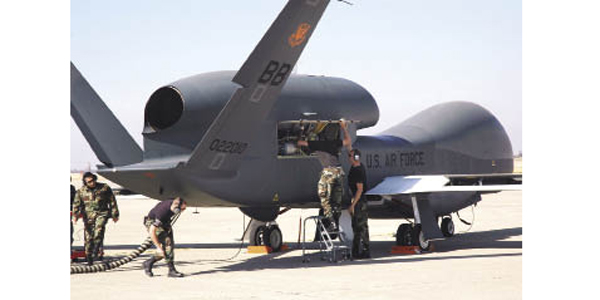
On a Wednesday in mid-June, the Norden Retirees Club scheduled its quarterly luncheon at a restaurant in Milford where Norden Laboratories first established a Connecticut lab during the Cold War.
The club may have a few more eligible members before long.
In setting its sights on bigger facilities at the expense of its Norden Systems plant in Norwalk, Northrop Grumman is bringing to an end an era in Connecticut, where it built up its production of bombsights before branching into radar and other high-tech offerings for the U.S. military.
With sales and profits down, Northrop Grumman is looking to cut costs where it can. The company earned $506 million in the first quarter, slightly below a year ago, as revenue dropped 8 percent to $6.2 billion.
Only 18 months ago, Northrop Grumman Corp. delivered the first production radar sensor for installation on the first U.S. Air Force Block 40 Global Hawk drone, with the system able to spot multiple objects on the ground in any weather, day or night, whether stationary or traveling at a high speed. Northrop Grumman”™s Norwalk facility produced the sensor in partnership with a Raytheon Co. unit in California.
The Norwalk closing will result in the loss of 300 jobs, many of them high-end engineers and managers who could represent valuable recruits for other companies in Connecticut.
Founder Carl Norden”™s bombsight was one of the major technological breakthroughs of World War II, when the company was based in New York. After being acquired in 1958 by a predecessor company of United Technologies Corp., Norden Labs opened a Milford facility followed by a Norwalk location; Northrop Grumman acquired it in 1996.
Heading into 2012, Northrop Grumman was already contending with several defense budget cuts that included some systems it sells to the government. In a conference call in late April, CEO Wes Bush acknowledged the giant was working aggressively to reduce costs.
And like other defense contractors, Northrop Grumman is confronted with the possibility of a Department of Defense “sequestration” process under the Budget Control Act that would slash Defense Department funding.
“Obviously that could be an impact to us and everybody in our industry,” Bush said. “Allowing sequestration to occur would simply have a devastating impact on the ability of the Department of Defense and other government agencies to support the security of our country, and it would have clearly a very negative impact on the defense industrial base, and so there is a lot of discussion, a lot of debate around how to deal with this ugly situation now.
At the same time, Bush said it would be “irresponsible” of the company in his words to take actions that would somehow slow down or impair its ability to meet its commitments.
“Everyone that”™s on the receiving end of this, including our customer community and ourselves, are sort of forced into the situation of having to plan contingency plans for the possibility of this very terrible thing actually happening,” Bush said. “So that”™s what we”™re doing from our side of the equation here in our company.”

















